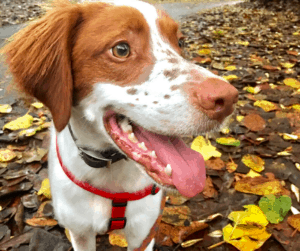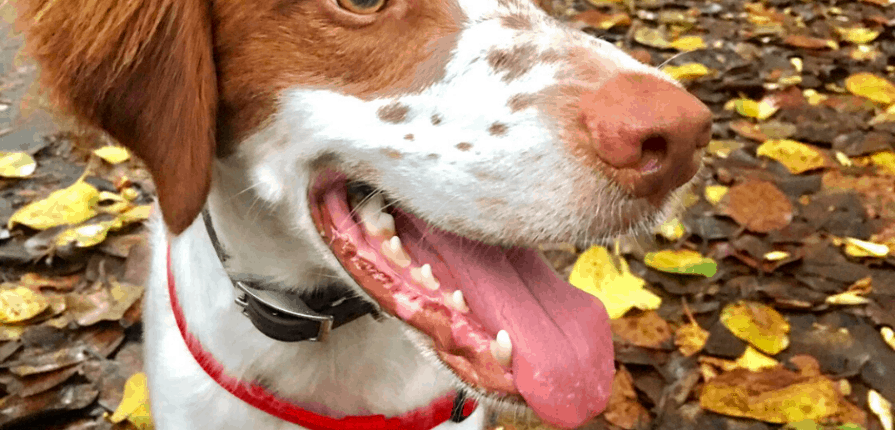
Poor dog dental health care can affect a pet’s overall health, longevity, quality of life, and interaction with its owner without exhibiting obvious clinical signs of disease. (AHA). So many pet owners think their pets’ teeth are fine but over ⅔ of adult pets have some form of periodontal disease. This is a painful infection that can ultimately affect the liver, heart, and kidneys through the spread of infection in the body. February is Dog Dental Health Month- the perfect time to learn about the dental care options available to your pups, from puppies to seniors. It’s never too late to help them live their healthiest lives!
Why we should care about dog dental health:
Periodontal disease is associated with poor health. There is an association shown between periodontal disease and systemic health issues. Bacteria and pathogens from the gums and teeth can impact your pup’s vascular system and organs. It’s important to prevent and/or treat these issues when they arise- which is why awareness is so critical as the first step.
Periodontal or gum disease is NOT uncommon in dogs. These are some dental issues your dogs may experience throughout their lives without proper care:
1. Plaque:
A soft film of bacteria and food debris that accumulates every day and sticks to the surface of a dog’s teeth. The mechanical forces of brushing easily remove plaque. If plaque is removed daily, a dog’s teeth and gums will stay healthy.
2. Tartar:
If plaque remains stuck on the surfaces of the teeth, minerals found in a dog’s saliva will harden this plaque into dental calculus-called tartar-which is firmly attached to the teeth. Don’t try to scratch it off at home as it will fracture the tooth. Tartar hides lots of issues that must be looked at by your veterinarian.
3. Gingivitis/gum erosion:
When tartar starts to dig into and below the gum tissue, the gums become red, irritated and inflamed, resulting in a condition called gingivitis.
4. Periodontitis:
Plaque bacteria below the gum line secrete toxic substances that cause further tissue damage. These bacteria, as well as the inflammation and tissue damage they cause, often stimulate a dog’s immune system. The immune system brings in white blood cells and other inflammatory chemicals to try to destroy the bacterial invaders. Unfortunately many of the supporting soft and bony tissues of the tooth are damaged in this process-a condition called periodontitis.
5. Tooth root abscess:
Once periodontal disease is established and there is active gingivitis and periodontitis, bacteria can gain deep access to the roots of the teeth. The bacteria are capable of slowly destroying the root of the tooth and its attachment to the jaw that deprives the root and tooth of its vital blood supply. This results in death of the affected tissue and again the immune system calls a tremendous number of white blood cells to the area that results in an accumulation of white blood cells-called pus or an abscess. Tooth root abscesses most commonly affect the large premolar teeth and a dog will often present with a painful soft swelling directly under the eye.
6. Loss of teeth
Beginning signs of periodontal disease:
| Difficulty Eating | Bad breath |
| Drooling | Tooth discoloration or visible tartar |
| Pawing at the teeth or mouth | Loose or missing teeth |
| Discharge from the nosee | Red, swollen or bleeding gums |
| Swelling under the eyes | Weight loss or loss of appetite |
Advanced signs of periodontal disease:
| Red or bleeding gums | Bad breath |
| Blood on a chew toy | Lumps or bumps in the mouth |
| Vocalizing when they yawn or eat | Ropey or bloody saliva |
| Loss of teeth | Head shyness (your pet not wanting you to touch their head) |
What are your dog dental health treatment options?
You have two options for your dog’s dental care, and they include professional cleaning and home care.
- Expect your pet to need a professional teeth cleaning every 6-12 months and expect general anesthesia to be necessary for each tooth to receive proper attention and care.
- Home care is ideally a daily part of tooth maintenance but even brushing just twice a week can remove most plaque before it can mineralize into tartar.
- Dental cleaning prophylaxis
- Always talk to your veterinarian for recommendations.
Dental cleaning/prophylaxis is the most effective treatment.
This is what to expect when you have a professional dental cleaning with anesthesia for your dogs in the safety of your veterinarian’s office.
- First, your pup will be sedated, intubated, and given gas anesthesia
- Pet parents can be concerned about the sedation. However, anesthesia for healthy pets is actually pretty safe though , with a mortality rate of about 0.05 to 0.15%.
- The tube in the pup’s trachea is keeping the spray of liquid from going into lungs so they won’t inhale any of the stuff coming off of their teeth (vs. non-anesthetic dentistry where there is no suction of liquid, inhaling all the gross stuff)
- Teeth are assessed with a probe to look for deep pockets
- Your veterinarian will check for loose teeth/issues
- They will X-ray at this time
- Your veterinarian will use a Cavatron, which sprays water on the tooth while ultrasonic cleaner cleans the tartar off the teeth. Go along gum line to clean deeper and look for issues afterwards
- They will look for gum erosion- if the root is exposed, the tooth will need to be extracted.
- They will polish the remaining teeth to smooth out the surface so that tartar can’t stick to teeth
Your veterinarian will prescribe antibiotics and enzymes as necessary, as well as pain and anti inflammatory medications as necessary. Once they get their teeth cleaned, you must brush daily after- each meal is ideal. Once they are pearly white again YOU have to maintain them.
Non-anesthetic Dentistry
Pros:
- Less expensive
- They come to your home
- Good in between professional veterinary cleanings
- Something is better than nothing if you’re foregoing professional veterinary cleanings
Cons:
- Surface-level cleaning/false sense of having done something.
- Teeth that have been scaled and not polished are a prime breeding ground for more bacteria growth which perpetuates oral disease.
- 60% percent of the tooth is located under the gum line! You can’t see pathology without radiographs, and dogs and cats can’t tell their dentist where the pain comes from.
- Can’t actually clean deeply and will refer you to a veterinarian for issues.
- There is no tube preventing inhalation of germs.
Dog dental health care at home means prevention
Whatever you decide to do, home dental care should be a part of your pets dental health care routine. Here are some Do’s and Don’ts of Brushing your Pet’s Teeth:
- Don’t use a human toothpaste on your pet.
- Do use a toothbrush without any paste at first so that your pet may get used to the object in the mouth before having to contend with flavor.
- Don’t attempt to clean the inner surface of your pet’s teeth. Natural saliva cleans this surface on its own.
- Do try to perform dental home care at least once daily.
- Don’t perform dental home care during the first week after a full dentistry in the hospital as your pet’s gums may be tender.
- Don’t consider dental home care as an alternative to full dental cleaning if your pet has more advanced dental disease.
Make sure you are gentle with your pup if it’s their first time getting their teeth brushed. You need to train them to enjoy this just as you trained them to get their nails clipped and get baths, with positive reinforcement. You can also use dental wipes at first if you have trouble with brushing. Please ask your veterinarian for recommendations for dental health care products, and good luck!
If you have any questions about your pet’s health, or if you need recommendations for a dog dental health provider, reach out to us! Our Pet Home Health services is here to help you. You can contact us directly, or call us at 305-794-3733 with questions!

A founding member of the Equipaws family, Frankie can mostly be found working behind the scenes, helping co-create online branding, managing several social media accounts, designing brand collateral, writing copy, and managing events. She also fills in for pet sitters and dog walkers when needed in Palmetto Bay, Pinecrest, and South Miami. Her own small pack consists of Boots the Shih Tzu mix and Nutmeg the Chiweenie.


I love how informative and concise this article is. Taking care of our dogs’ dental health is a responsibility we shouldn’t neglect.